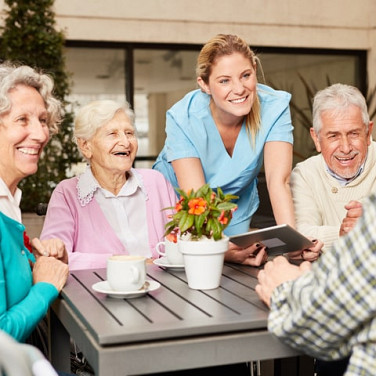As the sun blazes and temperatures soar, staying cool becomes a top priority for many. Coping with scorching summer days requires a combination of practical strategies and a bit of ingenuity to beat the heat effectively.
 1. Hydration is key:
1. Hydration is key:
One of the simplest yet most crucial strategies for staying cool is to stay well-hydrated. Drink plenty of water throughout the day to replenish fluids lost through sweating. Incorporating hydrating foods like watermelon, cucumber, and citrus fruits can also contribute to your overall fluid intake.
2. Dress smart:
Find YOUR ideal care home NOW!
Choose lightweight, loose-fitting, and light-colored clothing to reflect, rather than absorb, the sun's rays. Opt for breathable fabrics such as cotton to enhance ventilation and keep your body temperature down.
3. Seek shade and limit sun exposure:
Avoid direct sun exposure during peak hours, typically between 10 a.m. and 4 p.m. If you need to be outdoors, seek shade whenever possible. A wide-brimmed hat and sunglasses can offer additional protection from the sun's intense rays.
4. Create a cool haven at home:
Ensure your living space remains a cool refuge. Close curtains or blinds during the hottest part of the day to block out the sun. If possible, use fans or air conditioning to maintain a comfortable indoor temperature.
5. Embrace cool showers and baths:
Cool showers or baths can provide instant relief from the heat. Not only do they help lower your body temperature, but they also have a refreshing and revitalizing effect. Consider taking cool showers multiple times a day, especially during heatwaves.
6. Use cooling products:
Invest in cooling products like fans, cooling towels, or gel-filled pads that can be placed in the freezer. These items can offer quick and targeted relief, providing a respite from the heat.
7. Stay informed:
Keep an eye on weather forecasts and be aware of upcoming heatwaves. This information allows you to plan your activities and take necessary precautions, ensuring you're prepared for the hottest days.
Best practices for cooling your home
| Practice | Details | Effectiveness |
|---|---|---|
| Close Curtains | Use blackout curtains to block heat | Reduces indoor temperature |
| Install Ceiling Fans | Use fans to circulate cool air | Improves airflow |
| Use Energy-Efficient Appliances | Minimize heat from electronics | Keeps rooms cooler |
By incorporating these strategies into your routine, you can stay cool and comfortable even during the hottest summer days. Remember, the key is a combination of preparation, hydration, and a touch of resourcefulness.
Senior Home Plus is here to help you choose a care home or facility best suited to your needs. Do not hesitate to contact us on the following number: 0230 608 0055 or fill out this form.
FAQ:
What are the best ways to stay cool during summer?
Stay hydrated by drinking plenty of water, wear light and breathable clothing, use fans or air conditioning, and avoid outdoor activities during peak heat hours.
How can I cool down my home effectively?
Use blackout curtains to block sunlight, install ceiling fans, ensure proper ventilation, and turn off heat-generating appliances when not in use.
Are there specific foods that help keep the body cool?
Yes, water-rich foods like watermelon, cucumber, and oranges are great for hydration. Drinks like iced tea, lemonade, and coconut water also help maintain body temperature.
What should I avoid during extreme summer heat?
Avoid strenuous outdoor activities, consuming alcohol or caffeine excessively, and wearing heavy or dark-colored clothing.
When is it safe to exercise outdoors in the summer?
Exercise early in the morning or late in the evening when temperatures are cooler, and always stay hydrated.
How does hydration help in staying cool?
Proper hydration regulates body temperature, prevents dehydration, and helps replace lost fluids during sweating.
What are some quick remedies for cooling down?
Splash cold water on your face, use a damp cloth on your wrists or neck, or take a cool shower to lower your body temperature quickly.
Can older adults or children manage heat differently?
Yes, seniors and children are more vulnerable to heat. Ensure they stay hydrated, avoid direct sunlight, and remain in a cool environment.
How can I prevent heat-related illnesses?
Wear sunscreen, stay hydrated, avoid prolonged exposure to heat, and recognize early symptoms like dizziness, fatigue, or nausea.
What should I do if someone shows signs of heat exhaustion?
Move them to a cooler place, provide water, and loosen tight clothing. If symptoms persist, seek medical attention immediately.

